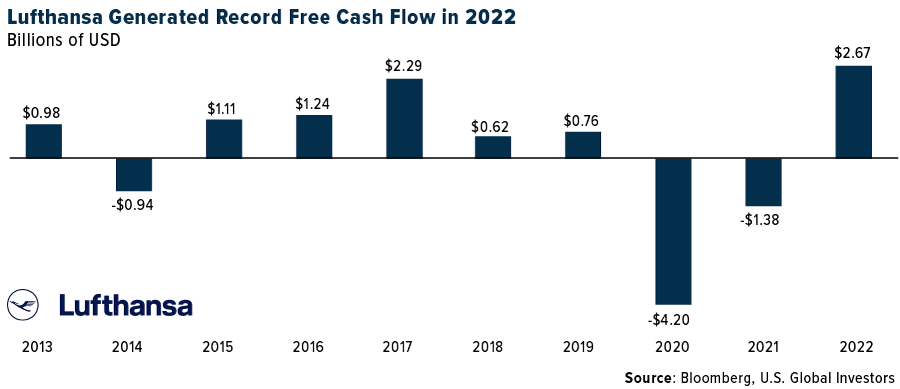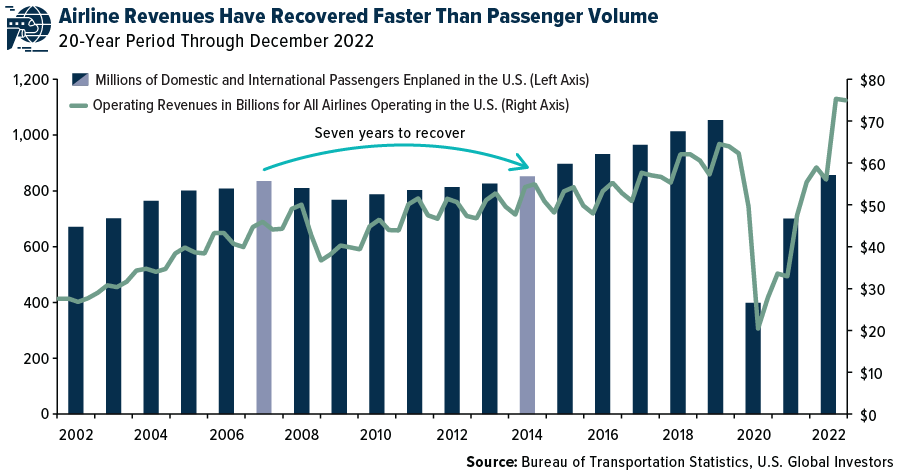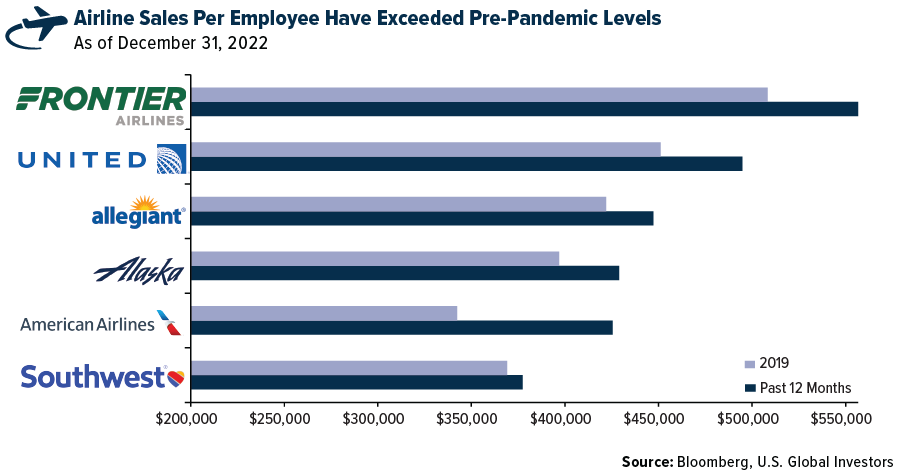“Lufthansa is back.”
Those are the enthusiastic opening remarks of Carsten Spohr, CEO of Deutsche Lufthansa, in the European airline’s earnings report for 2022, released last Friday.
It might be just as accurate to say that commercial aviation in general is back, with appealing investment opportunities.
Spohr reported that Lufthansa, Europe’s largest carrier group by revenue, achieved an “unprecedented turnaround” in 2022 on the back of increasing demand for air travel. Revenue of USD$34.5 billion was almost double what it collected in 2021, while free cash flow came in at $2.6 billion, the highest annual amount in the German company’s history. Shares were up approximately 5.3% in intraday trading on the news.

Lufthansa went on to announce that it ordered 22 new long-haul aircraft from Airbus and Boeing, the company’s largest order since 2013.
We like to see when a company invests in itself. It shows that management is optimistic about the future and is positioning the company for growth.
That’s exactly what airlines are doing around the globe right now. According to Airlines for America (A4A), U.S. carriers are investing a record amount in new aircraft, equipment, information technology and more. Capital expenditures are forecast to hit $27.0 billion this year, which would be significantly higher than the $21.2 billion airlines are estimated to have spent in 2022.
More Bang for the Buck
Lufthansa’s blockbuster report is just the latest signal that commercial aviation, one of the hardest-hit industries during the pandemic, may be ready to make a landing again in investors’ portfolios.
Travel demand is surging as Europe, China and other key markets have dropped travel restrictions, and in the interim, carriers have adapted by streamlining operations, eliminating unprofitable routes and more.
The actions appear to be working. Even though total passenger volume hasn’t fully recovered to pre-pandemic levels, operating revenues are soaring to new record highs, according to Bureau of Transportation Statistics (BTS) data.

Domestic airlines have managed this without having to cut jobs at the same pace as the tech industry. In fact, passenger airlines in the U.S. currently have the largest workforce in 20 years, according to A4A.
Staff members are also producing more bang for their buck. In the chart below, you can see that sales-per-employee for select carriers were higher in the past 12 months than in 2019, before the pandemic. This indicates that the decision not to sacrifice customer service in the name of cost-cutting has been financially rewarding for airlines.

This appears to be a win for airlines, win for employees, win for customers and a win for investors.
“Aviation Is Investible Again”
“Aviation is investible again,” says Jun Bei Liu, a portfolio manager at Sydney, Australia-based advisory firm Tribeca Investment Partners. Speaking to Bloomberg last month, Jun Bei said she believes Asian airlines “are going to go through the roof.”
We’ve previously highlighted Asian airlines, particularly after the Chinese government announced it was lifting pandemic-era quarantine requirements for travelers entering the country. We still agree with Jun Bei and others in forecasting a dramatic travel rebound in Asia this year, even though Chinese demand so far hasn’t been as strong as unexpected.
Perhaps surprisingly, shares of European carriers are leading those in Asia and the U.S. We say “surprisingly” because there are so many negative headlines about airlines right now, but often these headlines don’t accurately reflect what’s really happening. European airlines rose over 41% in the six months through the end of February, compared to Asian airlines, up 7%, and U.S. airlines, down slightly at negative 1%, over the same period.
To see the full list of holdings in the U.S. Global Jets ETF (JETS), click here.
To download a copy of the JETS prospectus, fact sheet and investment case, click here.
All opinions expressed and data provided are subject to change without notice. Some of these opinions may not be appropriate to every investor.
Please carefully consider a fund’s investment objectives, risks, charges, and expenses. For this and other important information, obtain a statutory and summary prospectus for JETS by clicking here. Read it carefully before investing.
Investing involves risk, including the possible loss of principal. Shares of any ETF are bought and sold at market price (not NAV), may trade at a discount or premium to NAV and are not individually redeemed from the funds. Brokerage commissions will reduce returns. Because the funds concentrate their investments in specific industries, the funds may be subject to greater risks and fluctuations than a portfolio representing a broader range of industries. The funds are non-diversified, meaning they may concentrate more of their assets in a smaller number of issuers than diversified funds. The funds invest in foreign securities which involve greater volatility and political, economic and currency risks and differences in accounting methods. These risks are greater for investments in emerging markets.
The funds may invest in the securities of smaller-capitalization companies, which may be more volatile than funds that invest in larger, more established companies. The performance of the funds may diverge from that of the index. Because the funds may employ a representative sampling strategy and may also invest in securities that are not included in the index, the funds may experience tracking error to a greater extent than funds that seek to replicate an index. The funds are not actively managed and may be affected by a general decline in market segments related to the index.
Airline Companies may be adversely affected by a downturn in economic conditions that can result in decreased demand for air travel and may also be significantly affected by changes in fuel prices, labor relations and insurance costs.
Fund holdings and allocations are subject to change at any time. Click to view fund holdings for JETS.
Distributed by Quasar Distributors, LLC. U.S. Global Investors is the investment adviser to JETS.
